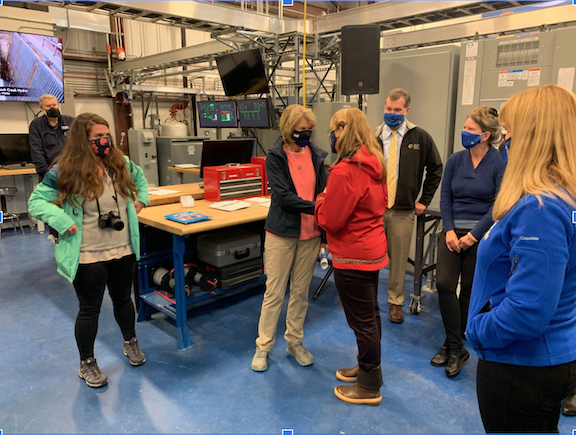U.S. energy secretary and Sen. Murkowski tour ACEP lab
U.S. energy leaders met recently in Fairbanks. Their visit coincided with the annual Chena Hot Springs Resort Renewable Energy Fair; guest speakers included Gov. Mike Dunleavy, Sen. Lisa Murkowski and U.S. Secretary of Energy Jennifer Granholm.
Murkowski visited UAF’s Alaska Center for Energy and Power booth at the energy fair staffed by Erin Whitney and Michelle Wilber. Whitney and Wilber also enjoyed discussing with visitors such subjects as energy equity, solar access for all, electric vehicles and other energy solutions.
This was Granholm’s first visit to Alaska as energy secretary, and, with Murkowski as her guide, she received an educational tour of research facilities, including ACEP’s Energy Technology Facility, the Cold Climate Housing Research Center, the Army Corps of Engineers Permafrost Tunnel Research Facility and the Alaska Native Science and Engineering Program at the University of Alaska Anchorage.
A Fairbanks Daily News-Miner article noted that Granholm told the crowd at Chena Hot Springs that she comes with a “sense of deep humility” for what Alaskans are doing in areas to mitigate climate change. In response, Murkowski echoed that message: “Our geography, our climate and our people have made Alaska a world leader in innovation.”

U.S Sen. Lisa Murkowski talks with UAF interim Vice Chancellor for Research Nettie La Belle-Hamer.
During the ETF lab tour, UAF leaders, ACEP Director Gwen Holdmann, ACEP researchers and the U.S. Department of Energy Arctic Energy Office staff reviewed ACEP research. The discussion touched on the role of the facility’s Power Systems Integration Laboratory in testing and validating community-scale microgrid technologies in remote communities.
Later that day, a few of the U.S. Senate Armed Services Committee staff visited ACEP to discuss several topics. Those included base energy resilience work by ACEP in Alaska; the opportunity for partnering with Alaska communities to do microgrid research relevant to developing and validating new technologies for use in forward operating bases and remote islanded microgrids; and the larger goals of building human and technological capacity and partnerships between communities, researchers and U.S. Department of Defense partners within Alaska.
Earlier in the weekend, some of the Alaska and Hawai’i congressional delegation staff visited ACEP’s lab. They discussed ways Alaska and Hawai’i could address energy needs of underserved and Indigenous communities in remote and islanded regions throughout the United States.
For more information, email Amanda Byrd at agbyrd@alaska.edu.


